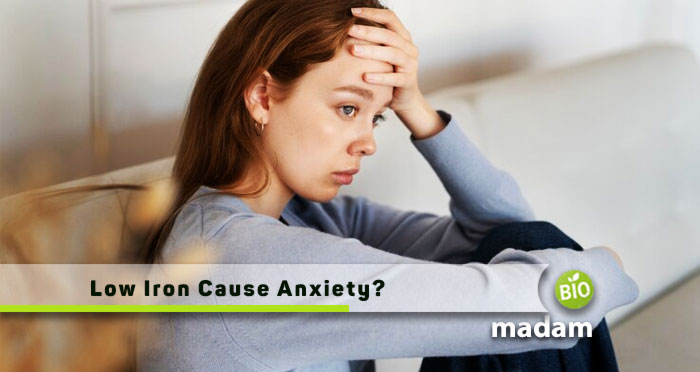We have normalized living a hectic life with little to less healthy nutrition, which tends to create deficiencies in our bodies. Among these deficiencies is the most common and overlooked one, called iron deficiency or anemia. Iron deficiency continues to deteriorate our immune system and cognitive impairment, which leads to heart failure and poor mental health.
Almost 10 million people in the United States have iron deficiency, including 5 million with iron deficiency anemia. It is also a common condition in Australia, making itself a widely known health problem. People with such issues often wonder, “Why does low iron cause anxiety? Today, we will figure out the impacts of this mineral deficiency and can low iron cause anxiety.
So, let’s continue reading with us to know how low iron can be a cause of anxiety for most people.
What Happens When You Are Low On Iron?
Did you ever wonder why you feel a certain rush of anxiety within you without any clear reason? We all go through this condition, sometimes even in normal situations. When we deprive our body of some basic macro and micronutrients for days, it starts to function in a survival mode. During this phase, we tend to ignore mild symptoms. This negligence leads to major issues like iron deficiencies.
Minerals are pretty important in different ways, for e.g., iron plays its part in helping our body produce neurotransmitters such as:
- Serotonin
- Dopamine
- Norepinephrine
Apart from that, iron is one of those vital elements responsible for the better functioning of other body parts. For instance, if your body does not have enough iron to produce hemoglobin, it leads to poor production of red blood cells in your body. Red blood cells then are unable to carry oxygenated blood throughout our body. These body malfunctions lead to severe mental health damage. Other common signs and symptoms caused by iron deficiency are as follows:
- Unusual cravings for non-nutritive substances, such as ice, dirt, or starch
- Weakness
- Pale skin
- Chest pain, fast heartbeat, or shortness of breath
- Brittle nails
- Inflammation or soreness of your tongue
- Headache, dizziness, or lightheadedness
- Poor appetite, especially in infants and children with iron deficiency anemia
- Extreme fatigue
I am sure you can relate to any of these symptoms. We face them on regular work days and decide to ignore them. However, these are the ways our body is telling us that we need the iron intake.
The Link between Iron Deficiency and Mental Health
There is a direct link between anxiety and low iron levels, which means overall poor mental health. Iron deficiency is likely to affect your mental health, causing anxiety, depression, schizophrenia, sleep disorders, and psychotic disorders. The impacts of iron deficiency are not limited to just non-physical damages. In severe cases, it can cause internal bleeding and, if not diagnosed on time, can lead to life-threatening situations. Apart from that, low iron levels can speed up the risks of psychiatric disorders such as:
- Attention deficit hyperactivity disorder
- Autism spectrum disorder
- Mood disorders
- Developmental disorders
Low iron levels can affect your mental health, so whenever you get a gloomy mood and lack of energy, consult a doctor. Only your doctor can help you figure out the root cause of your low iron level.
Can Iron Deficiency Affect Your Mental Health?
Yes, prolonged unattended iron deficiency (ID) can affect your mental health. It can cause severe neurological impairments, cognitive dysfunction, social trouble, emotional stress, neurophysiological disorders, and neurocognitive diseases.
The bad news is that it’s not that easy to recover. You may be required to take supplements with fruits, meat, and iron-enriched foods. This healing and recovery process may require weeks or months.
How Can I Raise My Iron Levels Fast Naturally?
You can quickly increase your iron level by consulting a doctor right after facing one or two symptoms. However, you can opt to have some foods that are high in iron, especially foods containing vitamins and minerals, including vitamin A, vitamin C, and beta carotene. A variety of foods contain iron in a way that has a direct effect on the absorbance in the body.

- Heme Iron: Foods like meat and poultry contain heme iron. Our body absorbs this type of iron quickly and easily.
- Non-heme Iron: This type of iron is present in plant-based and iron-fortified foods, such as spinach, collard greens, kale, sweet potatoes, peas, broccoli, string beans, dandelion greens, and chard. Such foods do contain iron, but our body takes time to absorb it.
When to See a Doctor?
I won’t recommend you to self-diagnose yourself and start taking supplements on your own. Above mentioned symptoms are enough alarm for you to understand you need to go to the doctor for a proper check-up. Any GP or doctor can do the job and prescribe you exactly what your body needs. Iron deficiency (ID) or Iron deficiency anemia cannot be self-diagnosed or treated, leave this matter for the professionals to resolve.
In a Nutshell
Low iron and anxiety are interlinked, so thoroughly check for the symptoms you’re getting. If any of the mentioned symptoms prolong, we suggest you immediately consult a doctor. Low iron levels can cause anxiety, depression, and poor mental health. The best way to cope with that is to get it treated on time. Mental health and iron deficiency go hand in hand, so fix one, and your next problems will be resolved themselves.

Hi, my name is Eva. I am currently practicing as a clinical social worker, that being my childhood desire. As a licensed therapist holding MPhil in Clinical Psychology, I am now on biomadam to provide the natives with the best family advice! Do you have any questions? See you in the comment section.

